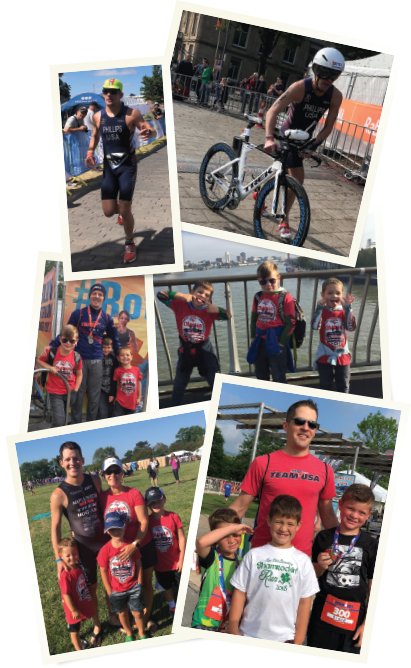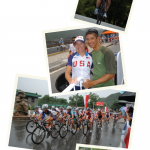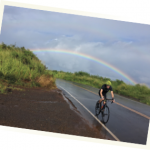“I think I’m mentally sharper when I have been exercising and taking care of myself,” says Chris Phillips, MD, a rheumatologist in solo practice in Paducah, Ky. Dr. Phillips has recognized these benefits since high school, when he began participating in competitive sports.
Four years ago, Dr. Phillips was competing against 40 other cyclists in a 20-mile road race about an hour away from his home. It was a beautiful summer day. Nearly an hour into the race, he and a few other racers had broken away from the front of the pack, riding along a straight stretch of road. He was just a few miles from the finish line and felt he stood a good chance of winning. All of a sudden, another cyclist cut in front of him, across his front wheel, knocking them both to the ground and out of the race. He ended up breaking his wrist.
“A few days later, I got a plate put into my wrist, which was painful,” says Dr. Phillips. “I enjoyed road racing, but that [incident] gave me pause to reconsider whether this was the right outlet for my competitive juices.”
Not long after that race, Dr. Phillips switched gears and began competing in triathlons, which still involves cycling, but is a bit safer because riders must typically remain at least six bike lengths from other cyclists. An active swimmer and runner since high school, he has entered nearly 20 triathlons over the past five years, ranging from sprints to Olympic, Half Ironman and world championship events.
Competing keeps him in shape and relieves his work stress, but he says the real rush comes from designing the perfect race by balancing the intensity of training with rest, hydration, nutrition, pacing and—yes—even the management of suffering.
Safer Outlet

TOP: Dr. Phillips, running in the 2018 ITU Long Course World Championship in Odense, Denmark (left), and at the 2017 ITU Olympic Distance World Championship in Rotterdam, The Netherlands.
MIDDLE: Dr. Phillips with his three sons at the 2017 Olympic Distance World Championships in Rotterdam, The Netherlands (left), and his three sons at the 2017 Olympic Distance World Championships in Rotterdam, The Netherlands.
BOTTOM: Dr. Phillips with his family at the Age Group National Championship in Omaha in 2016 (left), and with his three sons at the 2018 Half Ironman in Chattanooga, Tenn.
After graduating from medical school in 2005 from the University of South Carolina School of Medicine, Dr. Phillips completed his internship, residency and rheumatology fellowship at Washington University, St. Louis, School of Medicine.
“As an intern, I did a rotation in rheumatology,” he recalls. “Everyone on the rotation was happy. It seemed like they were normal people and went home at night. Also, the diseases they were treating and drugs they used intrigued me.”
In 2010, Dr. Phillips joined Jackson Purchase Medical Associates, a multispecialty group practice in Paducah, Ky., as its first rheumatologist. He says the group dissolved several years later after most of its primary care doctors began working for the local hospital. He then formed his own solo practice, called Paducah Rheumatology.
It was about that time he started competing in triathlons.
“After I broke my wrist, I was spending some time in the pool, swimming, and ran into some triathletes training in the pool,” he says. “They were competitive-minded people who got me thinking there was no reason that I shouldn’t compete in triathlons since I was doing all three sports anyway.”
He soon discovered that when he swam and cycled, he built up the muscles in his legs, which made him less prone to injuries when running. After competing in a handful of triathlons, he hired a coach in Madison, Wis.—a “hotbed” community for triathletes. Every week, they discuss his fitness and goals and tailor workouts focused on speed, strength, and/or endurance, depending on the phase of training or current race goals.
About one month before long races, he may bike 100 miles on Saturdays and then run five miles. On Sundays, he runs between 10 and 15 miles. He spends up to 14 hours each week in aerobic training, which doesn’t include time to warm up, cool down, stretch or weight train.
On the morning of a race, he’ll eat a hot bowl of oatmeal for protein and a banana for potassium, to help prevent cramps, and push fluids, such as sport drinks for electrolytes and beet juice, which he says helps improve performance. During races, he’ll ingest gel shots, which are pure glucose energy beverages.
“To a large extent, triathlons are a competition against yourself,” says Dr. Phillips. “You’re not in a pack with other people trying to see who can get to the finish line first. It’s safer since it’s more spread out over the course.”
Around the World
Over recent years, Dr. Phillips has won several races for his age group. He also competed in the Boston Marathon, three age group national championships in Omaha, Neb., and Cleveland and other races in Anchorage, Alaska, and Chattanooga, Tenn.
He has also competed in three world championship events—the 2016 Half Ironman World Championship in Australia, the 2017 Olympic Distance World Championship in Rotterdam, The Netherlands, and the 2018 ITU Long Course Triathlon World Championship in Denmark.
“I’m most proud of these two events,” says Dr. Phillips, referring to those in Australia and Rotterdam. “I set personal records, bested my own time in terms of distance. In neither race was I anywhere close to the top 10, because they were world championship events, but I proved to myself that I wasn’t last or anywhere close to last.”
He also brings his own cheerleaders—his wife, Katherine, and their three children, 10-year-old Bryce, 8-year-old Caleb and 5-year-old Grant—to events. “My family is my support group,” says Dr. Phillips. “When they come to these races, they sometimes blow loud horns, ring cow bells, climb on statues to see me and literally pick me up off the ground when I have no strength to even stand.”
Dr. Phillips says the injuries he has experienced have actually helped him better communicate and empathize with patients. “I’ve done physical therapy. I’ve injected my knee. I’ve injected my shoulder,” he says.
He also says competing in triathlons makes him happy and a better physician, and is a fun way to spend time with his family. Who could argue with that?
Carol Patton is a freelance writer based in Las Vegas.



